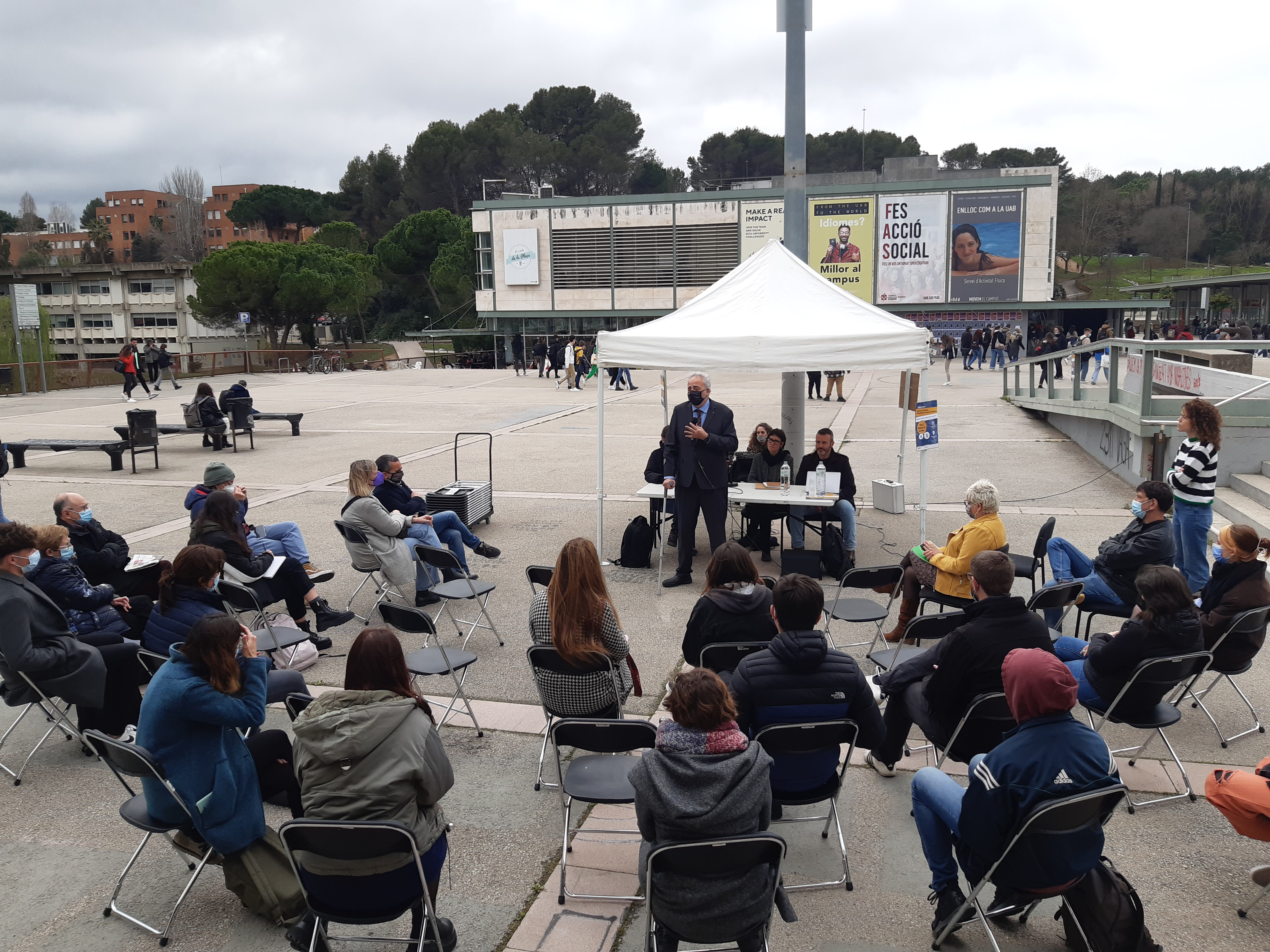Debate on civil society's response to the war in Ukraine
The UAB, through its Solidarity Foundation (FAS), and in collaboration with the School for a Culture of Peace, organised the debate "War in Ukraine: resistance and non-violent actions" on 16 March at the Plaça Cívica. The event focused on "civilian reflections, dilemmas and proposals" to talk about the current conflict from an anti-war and nonviolence approach.

The UAB's Fundació Autònoma Solidària, in collaboration with the School for a Culture of Peace at the UAB, organised a debate pm Wednesday 16 March entitled "War in Ukraine: resistance and non-violent actions". Despite the wind and low temperatures, a group of people came together at the Plaça Cívica to follow the debate. The event began with a brief speech by Rector Javier Lafuente, who affirmed that "the UAB does not aim to favour one or the other in this conflict, but it does aim to provide support to those in need and help them in any way possible".
Following his speech, researcher Marina Caireta from the School for a Culture of Peace moderated the debate with "civilian reflections, dilemmas and proposals" to respond to this crisis from an anti-war and nonviolence approach. Also participating were Ana Villellas, also researcher from the School for a Culture of Peace, and Felip Daza, in representation of Novact, which formed alliances with Ukraine a few years ago, and who was also lecturer at the University of Kyiv.
"These days we ask ourselves how we have gotten to this point, why did this happen and couldn't it have been foreseen. I, as many others, feel helpkess and concerned because I do not know what to do or how to help", Ana Vilellas began her intervention.
Both she and Felip coincided in emphasising the need to respond to violence with non-violence, making use of diplomacy and at the same time attacking the pillars of power (economy, media and weapons).
Felip Daza spoke on strategic non-violence and the need for it to be a movement truly led by civil society. He also referred to the media when saying: "There is a need to be conscientious of sa war at the level of media; it is very important for them to have their say in this conflict". And he questioned the idea of solving this conflict by giving weapons to civilians. He explained that news had reached him of Russian soldiers deserting, although that does not appear in the media. "The reponse must include human safety, and sincerely that does not pass through NATO, where a descaling of the violence and less weapons are needed to solve this", he pointed out. "Who says that there is a need for more arms is the United States of America, because they produce and sell these weapons", he concluded.
The debate in which several people actively participated also focused on questions such as: “What dilemmas are ther in relation to defensive military interventions?"; "What alternatives are there to militarisation? " and "How can we support local resistance and civil defense initiatives?".
Vice Rector for International Relations Màrius Martínez ended the event by going over the actions conducted by the University since the start of the conflict and the coordination of each action. He explained how the UAB had met with both the Ukranian and Russian communities on campus to offer any help they may need and that next week the UAB will also be meeting with students from Belarus, a country also directly involved in this war. He emphasised the importance of having a coordinated university response to this situation and welcomed any proposals or ideas the university community may have in support of those affected by this conflict.
Actions at University
As part of the international emergencies committee, the FAS coordinates the university's response on the UAB campus. If you form part of the university community and would like to send in your proposal or ask questions regarding the Ukrainian conflict, please write to: fas.cooperacio@uab.cat.
At the start of the conflict, the UAB opened a permanent line of communication with members of affected university communities, both those in the countries in conflict, to offer information and advice, and those at the UAB, who were invited to informative sessions in which the University's support to them was expressed and where they were offered all the help they may need. A support e-mail was created for those directly affected by the conflict in order to centralise petitions.
On 24 February, the Catalonia Interuniversity Council (CIC) activated its international emergencies protocol and, on 25 February, the universities met with the Ministry for Research and Universities to offer information on the number of university community members affected by the conflict, both due to internal displacements and to being here in Catalonia at the time when the conflict erupted.
Presently, the UAB international emergencies committee is preparing to make housing available for refugee university students, has contacted with the Ukrainian and Russian students enrolled in the UAB and continues to work in coordination with the CIC on all types of support actions. The UAB will communicate and channel its support mechanisms to all those affected by the conflict through the Fundació Autònoma Solidària, which will be in charge of distributing all aids.
The UAB is also working towards helping all people present in the conflict, whatever their nationality be, to meet the needs this conflict might have generated, without suffering any discrimination in the process. It will also work jointly with the Catalan university system in information and coordination actions aimed at mitigating the effects of this conflict.
More information:
The UAB, in favour of peace: statements rejecting military intervention
The UAB, with Sustainable Development Goals
Peace, justice and strong institutions